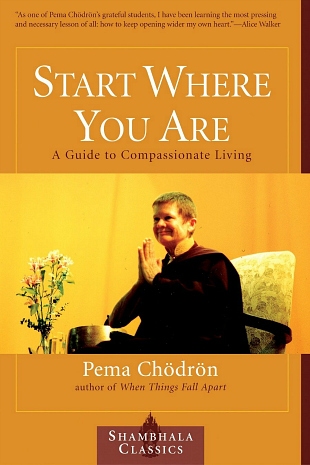Pema Chodron is an American Buddhist nun and one of the foremost students of Chogyam Trungpa, the renowned meditation master. She is Director of Gampo Abbey, Nova Scotia, the first Tibetan monastery in North America established for Westerners. In 1992 and 1993, she led one-month practice periods devoted to cultivating compassion through tonglen meditation and working with the lojong slogans (seven key points organized into 59 pity slogans). At the outset, Chodron writes: "If we are willing to stand fully in our own shoes and never give up on ourselves. then we will be able to put ourselves in the shoes of others and never give up on them. True compassion does not come from wanting to help out those less fortunate than ourselves but from realizing our kinship with all beings."
The practices in this incredibly helpful paperback are designed to enable men and women to develop trust in their awakened hearts, their bodhicitta. How can we cultivate this quality in our everyday lives? Chodron outlines the tonglen mediation practice which means "taking in and sending out." In the first stage of this practice, you rest in a state of openness or stillness. In the second, you work with the texture through breath awareness, visualizing that you are breathing in dark, heavy, and hot (claustrophobia or fixation) and breathing out white, light, and cool (spaciousness, freshness) through every pore in your body. The third stage works with a specific instance that you are aware of. You breathe in the pain of a person, animal, or distress you are personally feeling, and you breathe out something to relieve the pain — a good meal, kindness, confidence. In the fourth stage, you breathe in the pain of all those suffering like the one you have just cared for — all hungry people, all hurting animals in the world, all those feeling inadequate. You breathe out whatever will lighten their load. Chodron advises always working both with the immediate suffering of one being and with the universal suffering of all. In this way, your practice is both heartfelt and visionary. Tonglen meditation, according to the author, is a way to "let ourselves feel what it is to be human" and by doing so to widen our circle of compassion.
Chodron believes that we must always start our practice where we are, with what is presenting itself in our lives. If that is anger, hatred, resentment, impatience and greed, then stay with that. "You can feel like the world's most hopeless basket case, but that feeling is your wealth, not something to be thrown out or improved upon. There's a richness to all of the smelly stuff that we so dislike and so little desire. The delightful things — what we love so dearly about ourselves, the places in which we feel some sense of pride or inspiration — these also are our wealth." There is no place to run to and no place to hide. We have everything we need right here.
Chodron explains the lojong slogans, many of which are filled with wisdom and paradox. Here are a few of them: Abandon any hope of fruition. Always maintain a joyful mind. Don't be swayed by external circumstances. Always meditate on whatever provokes resentment. Drive all blames into one. Train wholeheartedly.
Start Where You Are is an essential resource for anyone on the spiritual path. It offers manifold insights and many practices that awaken compassion and soften the heart.
